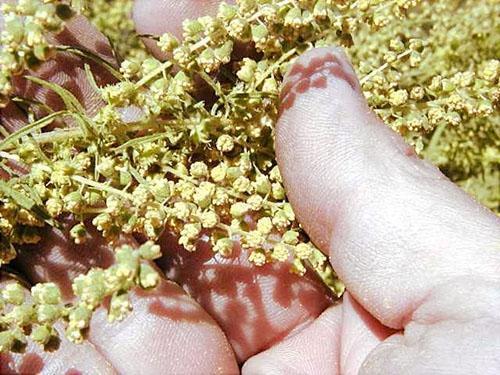What if you are allergic to watermelon?
 Cutting a ripe watermelon ringing loudly when tapped, hardly anyone expects that they will have to pay for the eaten slice with watery eyes, itching, sore throat and other allergy symptoms.
Cutting a ripe watermelon ringing loudly when tapped, hardly anyone expects that they will have to pay for the eaten slice with watery eyes, itching, sore throat and other allergy symptoms.
It is well known that melons, as allergens, practically do not pose a danger to humans. Neither pollen nor fruit can be harmful to health. Why do more and more people complain of discomfort after drinking watermelon? And can there be an allergy to watermelon?
In most cases, when the blame for the deterioration of health is blamed on the watermelon, the real culprit is the similarity of its effect on the body with ragweed pollen, one of the strongest allergens.

What is Cross Allergy?
 Ragweed, first introduced to Europe from America back in 1873, has become a serious problem for many countries, including Russia. Not only that, this and two other types of ragweed are weeds that quickly occupy arable land, the effect of pollen ripening in July on human health is even more dangerous. In Russia, a hundred years ago, the plant began to seize territories from the Stavropol Territory and Krasnodar Territory. Today ragweed thickets are found in the Primorsky Territory and the Voronezh Region, while the weed is steadily spreading to the north.
Ragweed, first introduced to Europe from America back in 1873, has become a serious problem for many countries, including Russia. Not only that, this and two other types of ragweed are weeds that quickly occupy arable land, the effect of pollen ripening in July on human health is even more dangerous. In Russia, a hundred years ago, the plant began to seize territories from the Stavropol Territory and Krasnodar Territory. Today ragweed thickets are found in the Primorsky Territory and the Voronezh Region, while the weed is steadily spreading to the north.
After inhaling microscopic particles of pollen, a person experiences all manifestations of allergies from lacrimation and fever to difficulty breathing and pulmonary edema. Allergy to watermelon has the same symptoms.
According to doctors, in areas where ragweed grows, up to 20% of the population is prone to allergies to its pollen and sweet pulp watermelon... But what do plants that do not even belong to the same family have in common? Speaking of cross-allergy, it is understood that the body reacts in almost the same way to several allergens that are similar in structure. In this case, the human immune system does not distinguish between close sets of amino acids in the composition of ragweed pollen and the sweet, sugary pulp of watermelon.
Mistaking a safe fruit for pollen, the body reacts violently to the invasion, showing the entire spectrum of allergy symptoms. At the same time, an allergy to watermelon is found in those who suffer most from hay fever, and with the spread of ragweed throughout the country, there are more and more such patients.
Watermelon allergy symptoms
A painful reaction of the body to watermelon manifests itself some time after a meal, when the digestion and absorption of the substances that make up the pulp begin.
 The most striking and common symptoms of watermelon allergy include:
The most striking and common symptoms of watermelon allergy include:
- allergic rhinitis;
- pain and pain in the throat;
- difficulty breathing up to Quincke's edema;
- redness of the eyelids and eyeball, lacrimation;
- itching and rashes on the skin and mucous membranes;
- swelling of the mucous membranes and soft tissues.
Since watermelon pulp, perceived by the body as an allergen, enters the digestive system, local symptoms may also occur:
- painful, accompanied by cuts and spasms, sensations;
- bloating and flatulence;
- nausea and vomiting;
- diarrhea.
 In some cases, if you are allergic to watermelon, weakness, dizziness and fever are possible. The nervous system reacts to the action of the allergen with excessive excitability of the patient or, conversely, with an inhibited reaction to what is happening.
In some cases, if you are allergic to watermelon, weakness, dizziness and fever are possible. The nervous system reacts to the action of the allergen with excessive excitability of the patient or, conversely, with an inhibited reaction to what is happening.
The most serious symptom of a watermelon allergy is anaphylactic shock.
This acute and dangerous condition for humans is accompanied by:
- a sharp drop in blood pressure;
- confusion or complete loss of consciousness;
- impaired coordination of movements;
- cramps in the limbs.

In children, the signs of an allergic reaction are similar, but the symptoms of a watermelon allergy are brighter and more threatening.
Watermelon allergy treatment
 Since watermelon has a more formidable twin allergen, it is extremely important to identify it in time and start a set of measures to alleviate the patient's condition and prevent the following attacks:
Since watermelon has a more formidable twin allergen, it is extremely important to identify it in time and start a set of measures to alleviate the patient's condition and prevent the following attacks:
- It is recommended to use antihistamines to relieve the symptoms of watermelon allergy, which has a cross-cutting nature.
- Modern sorbent preparations will help to accumulate and remove allergens from the body.
- If necessary, doctors prescribe corticosteroids to relieve itching and swelling.
Special assistance and a complete medical examination aimed at clarifying the true nature of watermelon allergy is possible only when contacting specialists.
Sometimes, in order not to experience discomfort from an allergy to watermelons, it is enough not to use them during the flowering season of a dangerous plant, ragweed, which occurs in July and part of August.
In this case, it will be much easier to move the hay fever season. However, there are exceptions, so the use of watermelon in food should be treated with caution at other times of the year, reducing portions and monitoring the body's reaction. Unfortunately, sometimes in favor of health, you have to completely abandon the sweet pulp.
 An urgent visit to a doctor is necessary when such formidable symptoms of watermelon allergy appear as:
An urgent visit to a doctor is necessary when such formidable symptoms of watermelon allergy appear as:
- swelling of the neck and face;
- difficulty breathing;
- heart palpitations;
- confused consciousness.
If signs of an allergic reaction are noted in a child, the slightest deterioration in well-being should be perceived as the reason for an immediate call to doctors.